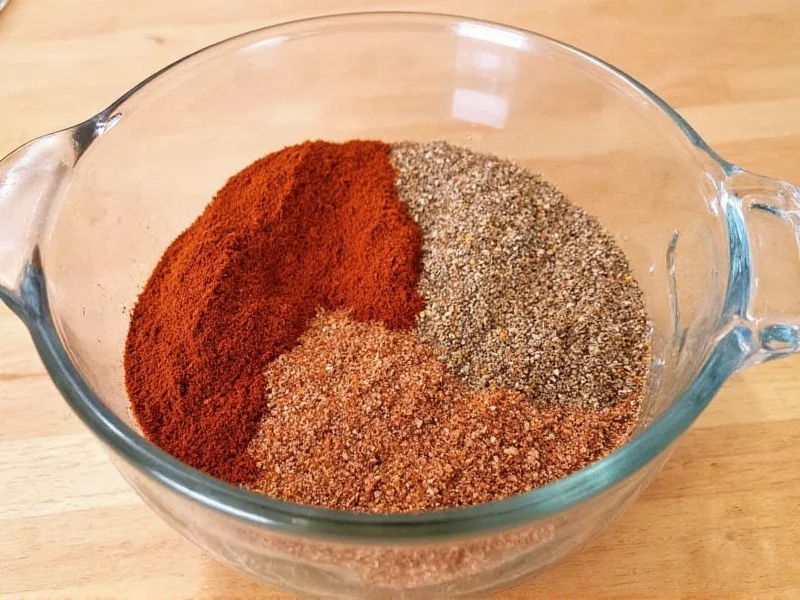Creating your own hamburger seasoning puts you in complete control of flavor profiles and ingredients. Unlike commercial blends that often contain fillers, anti-caking agents, and excessive sodium, a homemade version lets you adjust spice levels to personal preference while ensuring freshness and quality. This guide provides a foundational recipe with scientific insights into why certain spices work best with beef, plus customizable variations for different culinary preferences.
The Science Behind Burger Seasoning
Understanding how spices interact with ground beef elevates your seasoning from basic to exceptional. When making homemade hamburger seasoning from scratch, consider these flavor principles:
- Umami enhancers like garlic and onion powder amplify meat's natural savory notes
- Smoke compounds in paprika create the illusion of grilled flavor even when pan-frying
- Salt not only seasons but helps retain moisture in the patty
- Acidic elements like mustard powder cut through richness without making the meat wet
Professional chefs often emphasize that seasoning should complement—not mask—the natural flavor of quality ground beef. The ideal homemade burger seasoning without MSG balances these elements while allowing the beef's inherent taste to shine through.
Perfect Basic Hamburger Seasoning Recipe
This foundational blend works for 1-1.5 pounds of ground beef, the standard amount for four standard burgers. The measurements provide optimal flavor distribution without overwhelming the meat.
| Ingredient | Amount per Pound of Beef | Key Function |
|---|---|---|
| Paprika (sweet or smoked) | 2 teaspoons | Provides color and subtle sweetness |
| Garlic powder | 1 teaspoon | Umami enhancement without burning |
| Onion powder | 1 teaspoon | Depth of savory flavor |
| Sea salt or kosher salt | 1 teaspoon | Moisture retention and flavor conductor |
| Freshly ground black pepper | 1/2 teaspoon | Complex aromatic notes |
| Dried mustard powder | 1/2 teaspoon | Acidity to cut richness |
| Cayenne pepper (optional) | 1/4 teaspoon | Subtle heat that enhances other flavors |
Customizing Your Homemade Hamburger Seasoning
The beauty of making your own hamburger spice mix lies in customization. Consider these popular variations based on regional preferences and dietary needs:
Southwest Style
Add 1/2 teaspoon cumin and 1/4 teaspoon chili powder to the basic recipe. This homemade seasoning for juicy burgers works particularly well with grass-fed beef, which can sometimes have a stronger flavor that benefits from earthy spices.
Restaurant-Style Blend
Increase salt to 1 1/4 teaspoons and add 1/4 teaspoon celery salt. Many diners use this slightly saltier version because it compensates for the lower fat content in commercial ground beef. Remember that how much seasoning per pound of ground beef you use should increase slightly when working with leaner meats (90% lean or higher).
Low-Sodium Option
Reduce salt to 1/2 teaspoon and add 1/2 teaspoon nutritional yeast for umami depth. This alternative maintains flavor complexity while addressing dietary restrictions—a crucial consideration for those seeking homemade burger seasoning without excessive salt.
Proper Usage Techniques
Even the best easy homemade hamburger seasoning recipe fails when applied incorrectly. Follow these professional techniques:
- Mix gently: Combine seasoning with ground beef using fingertips, handling minimally to prevent toughening
- Chill before cooking: Refrigerate seasoned patties for 30 minutes to allow flavors to penetrate
- Season just before cooking: For best results, apply dry seasoning immediately before placing on heat
- Avoid overmixing: Create patties with a slight indentation in the center to prevent bulging
Many home cooks make the mistake of adding liquid ingredients like Worcestershire sauce directly to the meat before forming patties, which can create dense, tough burgers. Instead, incorporate liquids through basting during cooking for optimal texture.
Storage and Shelf Life
Your homemade hamburger seasoning blend maintains peak flavor for different durations depending on storage method:
- Room temperature in airtight container: 2-3 months
- Refrigerated: 6 months
- Freezer: Up to 1 year (prevents spice degradation)
Always use dry measuring spoons to prevent moisture contamination. For best results, write the preparation date on the container. Properly stored, your homemade seasoning for hamburger meat will retain vibrant flavor significantly longer than commercial blends, which often contain moisture-absorbing agents that degrade spice quality over time.
Troubleshooting Common Issues
Even experienced cooks encounter challenges with homemade burger seasoning from scratch. Here's how to solve frequent problems:
Problem: Seasoning falls off during cooking
Solution: Don't mix dry seasoning directly into the meat—instead, apply it to the surface of formed patties just before cooking. The dry surface creates better adhesion than meat mixed with seasoning.
Problem: Burgers taste bland despite seasoning
Solution: Increase salt content slightly (by 1/8 teaspoon) or add 1/4 teaspoon mushroom powder, which provides natural glutamates that enhance flavor perception without adding MSG.
Problem: Spices burn during cooking
Solution: Reduce heat slightly and avoid pressing burgers while cooking. Sugar-containing spices like paprika burn at lower temperatures than pure meat.











 浙公网安备
33010002000092号
浙公网安备
33010002000092号 浙B2-20120091-4
浙B2-20120091-4